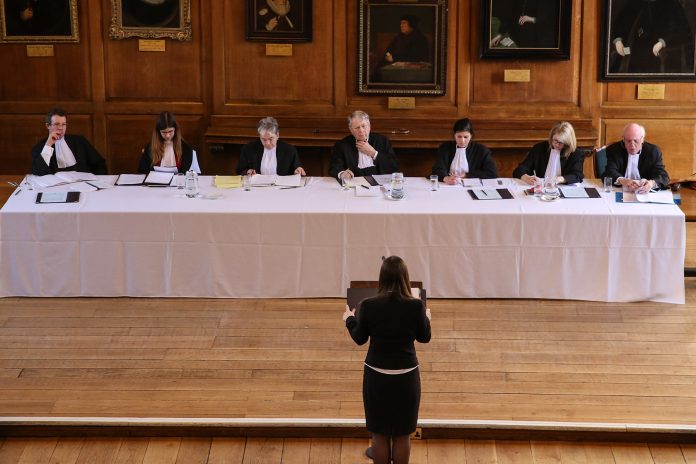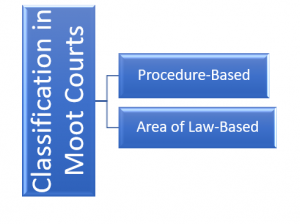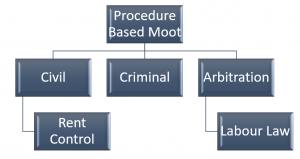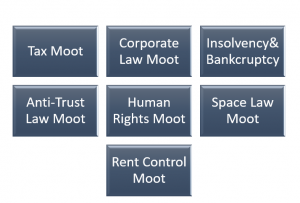How Are Moot Courts Categorized? Types of Moot Courts
Moot Courts are replicas of real-life courtrooms that are meant for preparing every aspiring law student for their litigations. Moot Courts are organised by different Law Schools and some prestigious ones are set up by legal authorities like the Bar Council of India. For every law student, it is essential to have Moot Court experience because that functions as a practical lab for them. They perform their oral arguments and display their analytical and oratory skills at the same time. While moot competitions are difficult for some beginners, they act as the stepping stones for entering the real world of every practising attorney.
Are Moot Court and Mock Trial the same?
Do you remember the Mock Trials from Suits’ “Pearson Hardman” ? There was always a real-life problem involved, a difficult case on which the firm was working. The entire firm became part of a mock court room and there was a claimant, an appellant and a judge. There were also witnesses, who were there to make the trial look real and prep the counsel for the real trial.
Well, Mock Trials usually happen in law firms to prepare fellow attorneys for any counter-arguments that may or may not occur. Mock trials do not usually happen at Law School stage because for then, we have Moot Courts!
On the other hand, Moot Courts are the preparatory ground for the law students and their “Moot Problem” is actually imaginary. The case or the Moot Problem is made up for the claimant and defendants to argue their case and make their points. While these problems are more or less made up, they are based very much on real-life cases. However, their sole aim is learning courtroom skills. This is why Moot Competitions are so important, that all law schools make it a part of their curriculum and all good lawyers a part of their CV!
Moot Courts are competitions that not just happen in India, but also on international platforms.
Some renowned Moot Court Competitions held in India are :
- Bar Council of India Moot Court Competition
- The NLU-Jodhpur Anti-Trust Moot Court Competition
- The NUJS-Herbert Smith National Corporate Law Moot Court Competition
- D.M. Harish Memorial Moot Competition, Government Law College
- Surana & Surana Moot Court Competition
Prestigious International Moot Court Competitions :
- The Oxford International Intellectual Property Law Moot, Oxford, U.K.
- The Philip C. Jessup International Law Moot Competition, Washington D.C., U.S.A
- The Willem C. Vis (East) International Commercial Arbitration Moot, Hong Kong, China
- The Willem C. Vis International Commercial Arbitration Moot, Vienna, Austria.
How are Moot Courts classified?
Moot Courts are basically classified on two criteria –
- By the procedure in which they are dealt with
- By the area of law concerned.
TYPE 1 : PROCEDURE-BASED
These are the types of Moot Court competitions that are divided into different types based on their proceedings or how they are carried out. For example: In an arbitration moot, the procedure of arbitration is followed when solving a problem situated around arbitration. Similarly, if the same is a Criminal Moot, a criminal problem is involved, which follows the process of a criminal case to reach its conclusion.
Let us understand the different types of Procedure-Based Moots:
-
CIVIL MOOTS
Civil Moots are based on cases surrounding civil problems like drunken driving, family matters, breaking traffic rules, breach of contracts, defamation etc. These moots are the most common type as they require basic understanding of civil laws like those stated above.
For example : Sir Syed National Moot Court Competition, organised by and at Aligarh Muslim University.
Here the moot problems are ONLY based on civil issues. Aligarh Muslim University held their first Moot Court Competition in 2014-15 around a civil issue of property inheritance and legal heirs. Such a Moot Court Competition falls under the category of Civil Moots.
-
CRIMINAL MOOTS
Criminal moots operate only on criminal cases. These deal with criminal cases that include crimes such as
- Homicide
- Manslaughter (or Murder)
- Rape
- Aggravated sexual assault
- Theft and burglary
- Conspiracy and fraud
- Possession of drugs
While the 7 elements of crime remain the same in all countries, the inclusions in crime may vary from country to country. A crime in one country may not be deemed crime in another.
For example:
Before 2018, Section 377 of the IPC, which dealt with homosexuality, mentioned that sexual acts with individuals of the same gender is a crime. The same wasn’t a crime in a country like the United States. However, homosexuality has been decriminalised in India now and is no more considered a crime.
Cases that deal with such crimes as stated above fall under the category of criminal law and have an entirely different type of proceeding.
Some important Criminal Law Moot Court Competitions are:
| Sir Syed & Surana & Surana National Criminal Law Moot Court, AMU |
| Amity National Moot, Amity University |
| National Criminal Law Moot, Bahra University, Shimla |
| KK Luthra International Criminal Law Moot Court, University of Delhi |
-
ARBITRATION MOOT
This is a unique type of Moot where both the parties opt for a private settlement instead of going to court. The parties opt for an arbitrator or a panel of 3 arbitrators in an arbitration tribunal. The Arbitration Moot Court functions the same way as the Arbitration Tribunal does. The arbitrator declares a binding decision for both the parties involved.
Here are some common characteristics of an arbitration :
- It is consensual
- The arbitrator is chosen by both the parties
- It is neutral
- It is a confidential procedure
- Decision is final
- Decision is easy to enforce
Some key Arbitration Moot Court Competitions held in India are listed below:
| International Infrastructure and Construction Law Arbitration Moot, NLU Delhi |
| Trilegal International Arbitration Moot (NLSTIAM) |
More on NLS Trilegal International Arbitration Moot:
Trilegal is a Law Firm that has been constituted by 4 alumni of National Law School, which teamed up with their Alma Mater, NLSIU Bangalore, to host this one-of-a-kind Arbitration Moot Competition. Trilegal is one of the top tier law firms based in the country’s financial capital, Mumbai. One of the most sought-after moots, this year NLSTIAM will see its XII edition being hosted in Bangalore. Prizes include awards, books on arbitration and an opportunity to intern at the Secretariat of SIAC worth over INR 2 Lacs. NLSTIAM has set its benchmark high from the beginning and strives to raise the bar each year.
TYPE-2: AREA OF LAW-BASED
Moot Courts are also classified on the basis of the Area or Domain of Law they belong to. There are specific acts or set of acts you can refer to, to successfully participate in such moot court competitions. They do not deal with types of procedures, but the types of factual backgrounds they represent. For example: Tax Moot, Corporate Law Moots, Insolvency and Bankcruptcy Law Moot, Animal Protection PIL, International Trade Law Moot, Anti-Trust Law Moot etc.
Area of Law-Based Moots falls in that category of Moots where a particular Act can govern the trial of the moot problems. The moot problems comprise of typical cases of real-life issues that are seen in the light of any of the acts listed above. It may be noted that this list is not exhaustive, but just indicative.
-
Corporate Law Moots
Cases involving a corporate set up like a company, a partnership, issues surroundings Mergers and Acquisitions, Shareholding etc are all covered under Corporate Law Moots. These moots are beneficial to those who are aspiring to make a career as a legal advisor or legal counsel for companies. Corporate Law Moots are very common in India and participating in these moots gives any student an edge over their non-participating peers. While the scope of practice widens, mooters also get a taste of what a real business problem looks like.
Classic Moots that surround Corporate Laws are :
| Surana & Surana National Corporate Law Moot |
| NUJS Herbert Smith National Corporate Law Moot Court Competition, Kolkata |
| Amity Moot Court Competition, Delhi |
| NALSAR Justice Bodh Raj Sawhney Moot Court Competition, Hyderabad |
| KLA Moot Court Competition, Kerala |
| NFCG-NALSAR Moot Court Competition on Corporate Governance, Hyderabad |
| All-India Corporate Law Moot Court Competition, NLU Delhi |
As we can see by the number of Moot Competitions solely surrounded around Corporate Law, it is understandable how sought-after and elusive these are. Participation in these Moot Courts certainly is a great learning experience and also a confidence-boosting factor. The prizes at most of these moots range from cash prizes to awards for best oralist, best claimant and best defendant, apart from team awards.
-
Tax Law Moots
In a country where tax evasion is a very common phenomenon, and tax planning takes a backseat when individuals and companies all resort to concealing their true income figures. India has a progressive taxing system, which means, the higher the income bracket, the higher is the taxable amount and tax payable. In such situations, it becomes hard to trace and identify frauds and evasions, but they may have huge impacts. Taxation Law Moot is based on applicability of certain tax laws on individuals or otherwise.
For example: A typical moot problem could question under one of the indirect tax acts (Now GST), the applicability of the stipulated tax rate on part of or whole of a newly-launched product, about which there is much ambiguity. Such moot problems and cases are very interesting to contest and can put int the limelight, some talented Tax Lawyers for the future, which assist in safeguarding the taxation system of the country.
Important Tax Law Moot Competitions are listed below:
| Dr. Y.P. Trivedi National Tax Law Moot Court Competition, GLC Mumbai |
| Nani Palkhivala Memorial Tax Moot, Thanjavur |
| NUJS-AIFTP Justice Dr. B.P. Saraf National Tax Moot, Kolkata |
| KR Ramamani Taxation Moot Court Competition, Chennai |
| Taxation Law Moot, ILS Law College, Pune |
-
Anti-Trust Law Moots
Anti-Trust Laws are laws that regulate the competition in any economy. These are the laws that neutralize the effects of abuse of unfair trade practices like price-fixing, restraints, price discrimination, and monopolization. Operation of these laws is very important in a country for encouraging fair practices and healthy competition.
Listed below are some Anti-Trust Law Moots:
| NLU Anti-Trust Law Moot, NLU Jodhpur |
| Anti-Trust Law Moot Court Competition, Christ University, Bangalore |
Moot court competitions are usually held in the months of March-May. Some of them also start off early in the year. It is remarkable to note that moots have helped thousands of students to step into the real courtroom and be exposed to the litigation life. Attending moot court competitions are vital experiences you can take home and also firmly paste onto your CV to leave a sparkling image right there.








